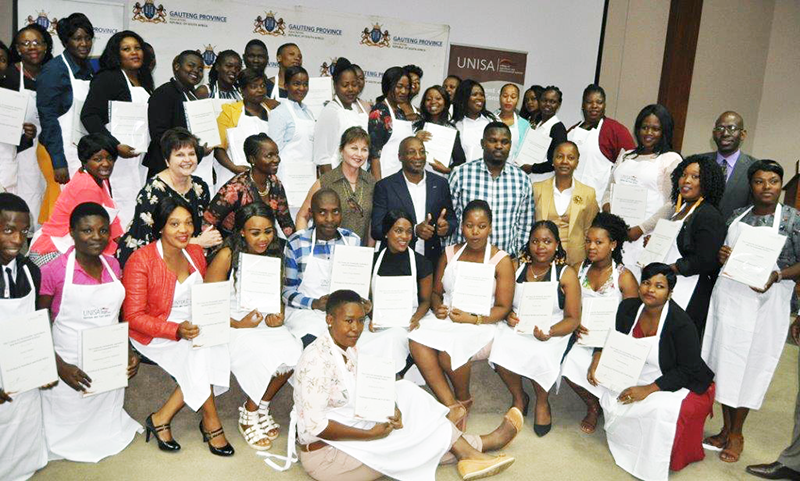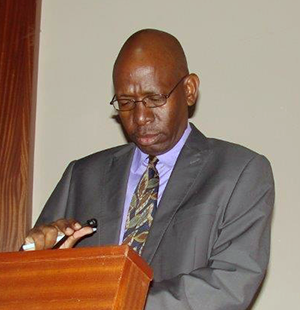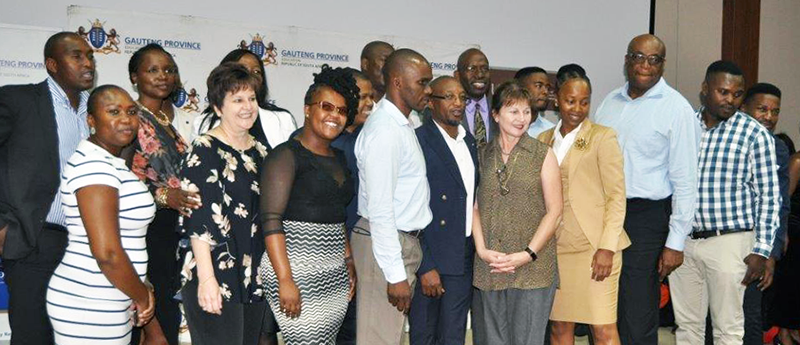
Equipped with state-of-the-art laboratories that provide students with hands-on experiences to bridge theory and practice

Graduates and delegates from the Department of Education and Unisa's Department of Life and Consumer Sciences at the pilot project certificate awards ceremony
The National School Nutrition Programme (NSNP) is a flagship programme of government that is mandated with the provision of nutritious meals to learners on all school days. The objectives of the NSNP are to enhance learning capacity and improve access to education through the provision of a nutritious meal to targeted learners as stipulated in the Conditional Grant Framework (CGF). The programme also seeks to promote healthy lifestyles amongst learners through nutrition education and self-supporting school food gardens and other production initiatives.

Prof. Sogolo Lebelo (CoD: Life and Consumer Sciences, CAES)
The programme is cited as a poverty-alleviation tool that creates short-term employment through the engagement of parents or guardians as volunteer food handlers (VFH) who are responsible for the preparation and serving of meals to learners. Proper food handling and good hygiene practices are of vital importance in order to avoid undesirable outcomes such as food poisoning.
NSNP then took an initiative to establish a partnership with Unisa to provide training for the handlers on nutrition and food safety as part of their short learning programme. A pilot project, which was meant to test the feasibility of the course, was undertaken and training took place from 2 to 8 October 2018.
The desired outcomes of the pilot project were to improve food handling in schools but also create a platform where VFHs are equipped with the necessary skills and knowledge on proper food handling and basic nutrition which can be used in the future. It is envisaged that this opportunity will grant VFHs with an opportunity to compete in the job market when their contracts expire,
The project is part of the community engagement key performance area of Unisa. Through this KPA, the university is committed to collaborate with communities (local, regional/state, national, global) for the mutually beneficial exchange of knowledge and resources in a context of partnership and reciprocity.
The Department of Life and Consumer Sciences Community Engagement in Unisa’s College of Agriculture and Environmental Sciences (CAES) has decided to combine nutrition and food safety training for food handlers. The focus of the nutrition and food safety workshop is to empower the students on the basic knowledge of nutrition, better preparation method and the importance of safe handling of foods.
Intake and graduates
The selected candidates were South African citizens with grade 12/matric and who were under the age of 35. A total of 47 students from 15 districts in the Gauteng Department of Health were trained in the programme. The first intake of students attended training from the 1 to 8 October 2018 in the food laboratories of the Unisa Science Campus.

Delegates from the Gauteng Department of Education and Unisa's Department of Life and Consumer Sciences
Objectives
The participants also went through practical sessions, which included swabbing of their hands for pathology purposes.
Forty-one VFHs completed the programme successfully and they were awarded their certificates on 14 March 2019.
The first training was a resounding success and has made a meaningful impact on the lives of the VFHs. Obtaining the certificate will give the VFHs an opportunity to compete in the job market as they have acquired the requisite skills and training.
*By Florence Malongane and Gugulethu Ngcobo
Department of Life and Consumer Sciences
Publish date: 2019-03-20 00:00:00.0